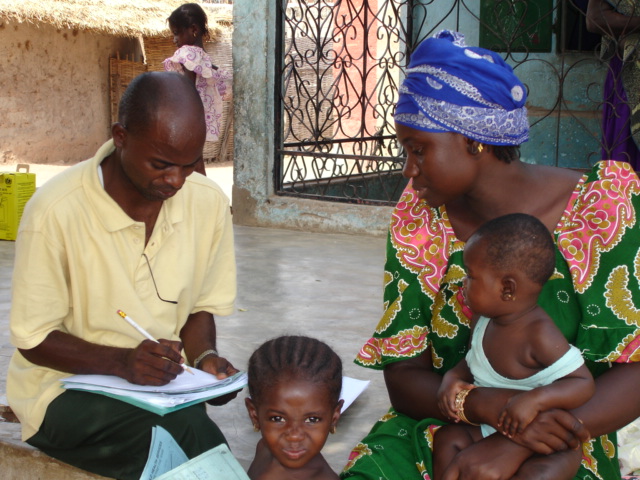
The BFCI programme is a comprehensive nutrition and health education package developed by the National Nutrition Agency (NaNA) to improve the health and nutritional status of communities. The concept of the BFCI is based on the UNICEF/WHO global strategic initiative of the Baby Friendly Hospital Initiative. The BFCI was piloted in 12 communities in Lower River Region (LRR) in 1995 and the initiative focuses on the communities using a holistic approach to ensure optimal infant and young child feeding practices. The components of the BFCI include maternal nutrition, infant and young child feeding, personal hygiene and environmental sanitation, growth monitoring and promotion. Since its inception, the BFCI has served as a motivating tool for promoting optimal maternal, infant and young child nutrition; water, hygiene and sanitation; growth monitoring and promotion in the implementing communities.
Based on the successful implementation of the programme in the pilot communities, it has been gradually expanded to 326communities across the country. Continued expansion to include all Gambian communities is underway. The overall objectives of the BFCI are to:
- Empower communities, especially women, through information to enable them make the right choices in the feeding of their infants. The BFCI encompasses the whole spectrum of infant feeding, recognizing that inappropriate weaning practices and poor environmental sanitation and hygiene are also contributors to poor nutritional and health status among Gambian children.
- Increase access to other preventative and promotional interventions for children and mothers including emergency obstetric care, immunization, appropriate treatment for diarrhoea and common childhood diseases, family planning, impregnated mosquito nets, hygiene practices, water and sanitation.
- Establish Village Support Groups (VSG) as entry points for other health related interventions in the Primary Health Care communities.
The attainment of these objectives requires changes in attitudes, behaviours and practices. However, these changes are difficult and slow to achieve. Trained and motivated trainers and VSGs can help in achieving these and facilitate the creation of an enabling environment for such desirable changes to happen. The BFCI training is therefore aimed at increasing knowledge and developing the skills needed to achieve these changes in attitudes, behaviours and practices.
The implementation of the BFCI takes the following steps:
- Conduct situational analysis in the village to understand the organizational set up, the functionality of the Village Development Committee (VDC), local capacities and infant and young child feeding practices.
- Sensitise communities on the BFCI concept and the composition and eligibility criteria for the selection of the VSGs
- Identification and selection of the VSGs
- Conduct training of trainers and supervisors
- Conduct training of VSGs
- Implement the components of the BFCI through house-to-house visits, counselling of mothers and their spouses, community meeting, drama and role plays, song by Traditional Communicators, facilitating environmental sanitation and other community services
- Carry out monitoring and supportive supervision
The first expansion was supported by the Participatory Health, Population and Nutrition Project (PHPNP) and subsequent expansions were supported by the Rapid Response Nutrition Security Improvement Project (RRNSIP), UNICEF and the Government of The Gambia. The MCNHRP further supported the scaling up of the BFCI from 776 communities to an additional 256 communities, which brought the total number of communities implementing the BFCI to 1032 as of June 2019. There are 20 communities in LRR, 30 in URR, 145 in CRR, 20 in NBW and 41 in NBE. Since the scaling up of the BFCI is linked to the expansion of Primary Health Care (PHC), currently all the existing and identified PHC villages now have trained VSGs and are implementing the BFCI. During the period of scaling up of the BFCI under the MCNHRP 2,048 VSG members have been trained.
To facilitate the conduct of cleaning the environment, sanitary materials were procured and distributed to the BFCI communities. The criteria for becoming baby friendly include having a trained Village Support Group on Infant and Young Child Feeding Practices. An enabling environment created for mothers to practice optimal infant and young child feeding including breastfeeding. An enabling environment is where mothers will not be faced with constraints when they want to feed and look after their babies, as advised by the VSGs. Village Support Groups are groups of 5 women and 3 men voluntarily selected by their communities to promote the BFCI strategy including the Village Health Worker and Community Birth Companion (CBC), known before as the Traditional Birth Attendant. They are formed and trained in the following areas:
- Maternal nutrition before, during pregnancy and lactation
- Infant nutrition, breastfeeding and complementary feeding practices
- Children and infants with special feeding needs
- Environmental sanitation and personal hygiene
- Growth monitoring and promotion
- Nutrition care during diarrhoea and other common childhood illnesses
- Micronutrient Deficiency Control
- Infant feeding and HIV/AIDS
- Diet related Non-Communicable Diseases
The composition and eligibility criteria for selection of VSG members are that person:
- Must be a permanent resident of the community
- Must be willing to offer voluntary service to the community
- Must be identified and selected by the community
- Should be 18 to 60 years of age, and
- CBCs and VHWs are Ex-Officio members
- Should comprise of 5 women and 3 men.
The Roles of the Village Support Groups are:
- Ensure that their communities have an enabling environment for mothers to practice optimal infant feeding especially exclusive breastfeeding
- Disseminate information on maternal and infant nutrition, personal hygiene, food hygiene and safety to mothers and other caregivers in their community.
- Disseminate information to the community on proper environmental sanitation including water sanitation.
- Give the necessary support to pregnant and lactating mothers to encourage them to practice optimal infant feeding.
- Assist mothers who are not able to breastfeed their infants by advising them on other safe alternatives (e.g. cup feeding).
- Encourage parents to take their children to the clinic regularly for growth monitoring and immunization.
- Ensure that their community follows the 10 steps to successful infant feeding.